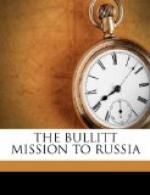Mr. CLYNES. I ask the question because it has been repeatedly alleged.
Mr. LLOYD GEORGE. We have had no approaches at all. Constantly there are men coming and going to Russia of all nationalities, and they always come back with their tales of Russia. But we have made no approach of any sort.
I have only heard reports of others having proposals which they assume have come from authentic quarters, but these have never been put before the peace conference by any member, and therefore we have not considered them.
I think I know what my right honorable friend refers to. There was some suggestion that a young American had come back from Russia with a communication. It is not for me to judge the value of this communication, but if the President of the United States had attached any value to it he would have brought it before the conference, and he certainly did not.
It was explained to me by the members of the British delegation who called on me, that the reason for this deception was that although when Lloyd George got back to London he intended to make a statement very favorable to peace with Russia, he found that Lord Northcliffe, acting through Mr. Wickham Steed, the editor of The Times, and Mr. Winston Churchill, British secretary for war, had rigged the conservative majority of the House of Commons against him, and that they were ready to slay him then and there if he attempted to speak what was his own opinion at the moment on Russian policies.
MR. BULLITT RESIGNS
Senator KNOX. Mr. Bullitt, you resigned your relations with the State Department and the public service, did you not?
Mr. BULLITT. I did, sir.
Senator KNOX. When?
Mr. BULLITT. I resigned on May 17.
Senator KNOX. For what reason?
Mr. BULLITT. Well, I can explain that perhaps more briefly than in any other way by reading my letter of resignation to the President, which is brief.
Senator KNOX. Very well, we would like to hear it.
The CHAIRMAN. Before that letter is read, you did not see the President and had no knowledge of his attitude in regard to your report?
Mr. BULLITT. None whatever, except as it was reported to me by Col. House. Col. House, as I said before, reported to me that he thought in the first place that the President favored the peace proposal; in the second place, that the President could not turn his mind to it, because he was too occupied with Germany, and finally—well, really, I have no idea what was in the President’s mind.
Senator KNOX. There never was another effort to secure an audience with the President for you after those first two that you say Col. House made?
Mr. BULLITT. No; not at all. Meetings with the President were always arranged through Col. House.
In my letter of resignation to the President, which was dated May 17, 1919, I said:




